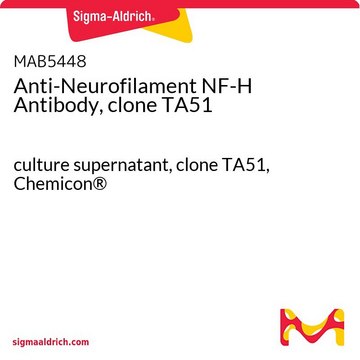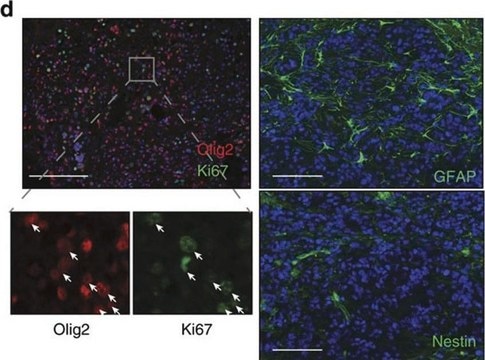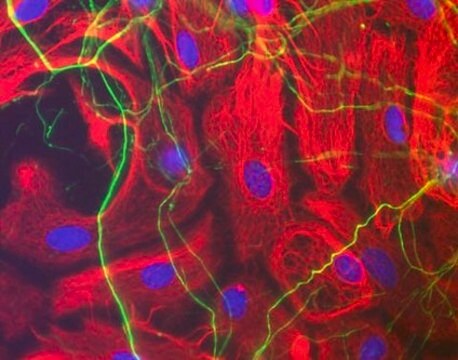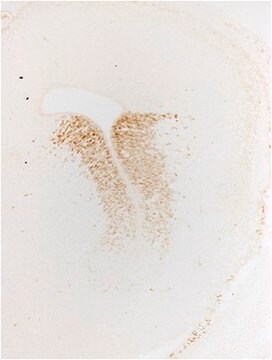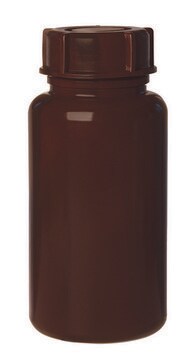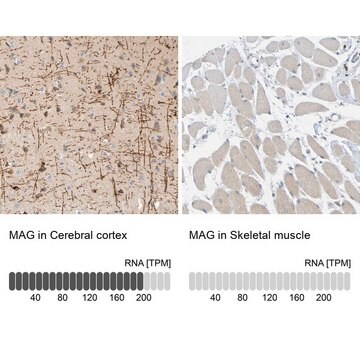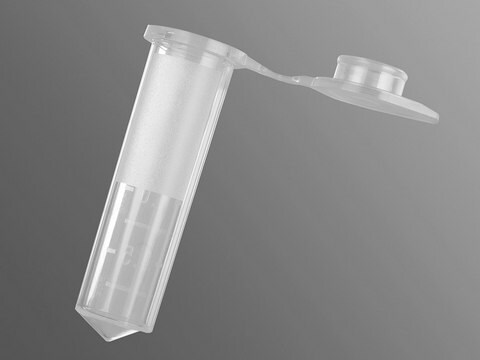MAB5256X
Anti-Neurofilament H Antibody, clone NE14, Alexa Fluor™ 488 Conjugated
clone NE14, from mouse, ALEXA FLUOR™ 488
Synonym(e):
200 kDa neurofilament protein, Neurofilament triplet H protein, neurofilament, heavy polypeptide, neurofilament, heavy polypeptide 200kDa
About This Item
IHC
immunohistochemistry: suitable
Empfohlene Produkte
Biologische Quelle
mouse
Qualitätsniveau
Konjugat
ALEXA FLUOR™ 488
Antikörperform
purified immunoglobulin
Antikörper-Produkttyp
primary antibodies
Klon
NE14, monoclonal
Speziesreaktivität
human, rat, pig, porcine
Methode(n)
immunocytochemistry: suitable
immunohistochemistry: suitable
Isotyp
IgG1
NCBI-Hinterlegungsnummer
UniProt-Hinterlegungsnummer
Versandbedingung
wet ice
Posttranslationale Modifikation Target
unmodified
Angaben zum Gen
human ... NEFH(4744)
pig ... Nefh(100156492)
rat ... Nefh(24587)
Allgemeine Beschreibung
Spezifität
Immunogen
Anwendung
Neurowissenschaft
Neurofilament & Neuronen-Stoffwechsel
5-10 µg/mL on frozen brain tissue. Optimal working dilutions must be determined by end user.
Qualität
Zielbeschreibung
Physikalische Form
Lagerung und Haltbarkeit
Hinweis zur Analyse
Rat Cortex Cells.
Sonstige Hinweise
Rechtliche Hinweise
Haftungsausschluss
Sie haben nicht das passende Produkt gefunden?
Probieren Sie unser Produkt-Auswahlhilfe. aus.
Lagerklassenschlüssel
12 - Non Combustible Liquids
WGK
WGK 2
Flammpunkt (°F)
Not applicable
Flammpunkt (°C)
Not applicable
Analysenzertifikate (COA)
Suchen Sie nach Analysenzertifikate (COA), indem Sie die Lot-/Chargennummer des Produkts eingeben. Lot- und Chargennummern sind auf dem Produktetikett hinter den Wörtern ‘Lot’ oder ‘Batch’ (Lot oder Charge) zu finden.
Besitzen Sie dieses Produkt bereits?
In der Dokumentenbibliothek finden Sie die Dokumentation zu den Produkten, die Sie kürzlich erworben haben.
Unser Team von Wissenschaftlern verfügt über Erfahrung in allen Forschungsbereichen einschließlich Life Science, Materialwissenschaften, chemischer Synthese, Chromatographie, Analytik und vielen mehr..
Setzen Sie sich mit dem technischen Dienst in Verbindung.

